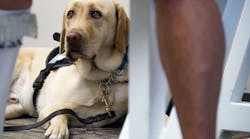Airlines for America Applauds the Department of Transportation’s Final Rules on Traveling by Air with Service Animals
WASHINGTON, December 2, 2020 – Airlines for America (A4A), the industry trade organization for the leading U.S. airlines, applauds the Department of Transportation’s (DOT) final rules regarding traveling by air with service animals.
“Airlines are committed to promoting accessibility for passengers with disabilities and ensuring their safe travel. The Department of Transportation’s final rule will protect the traveling public and airline crewmembers from untrained animals in the cabin, as well as improve air travel accessibility for passengers with disabilities that travel with trained service dogs,” said A4A President and CEO Nicholas E. Calio. “We commend Sec. Chao for her leadership in both aviation safety and passenger accessibility.”
The DOT’s final rules bring the definition of a service animal into alignment with the Department of Justice’s definition under the Americans with Disabilities Act (ADA), defining a service animal as a dog that is individually trained to do work or perform tasks for the benefit of a qualified individual with a disability. This does not include emotional support animals (ESAs). The DOT’s leadership with this rule will advance the rights of passengers with disabilities, while protecting service dogs, passengers and crewmembers from untrained animals on airplanes.
The safety and well-being of every traveler is the highest priority for U.S. airlines. Over the past years, the number of passengers on U.S. airlines traveling with ESAs in the cabin has skyrocketed, causing a sharp increase in incidents caused by ESAs. The misbehavior of some ESAs has ranged from mauling and biting to urinating and defecating. This misbehavior not only threatens the health and safety of passengers and crew, but also passengers with disabilities traveling with trained service animals. A broad range of stakeholders including consumer, disability, labor and service dog training organizations have advocated for changes to stop this abuse.
The DOT’s final rules will facilitate a smooth and safer travel experience for qualified individuals with a disability who need to travel with a service animal but will also prevent service animal-related fraud and abuse that has become so prevalent that it has jeopardized health and safety in the cabin, placed an unacceptable and unsustainable burden on airlines, and caused a negative stigma for legitimate service animals.
We are grateful for the DOT’s important work on this critical decision, which will strengthen our ability to provide passengers with disabilities the accommodations they need with the highest level of safety and service.


